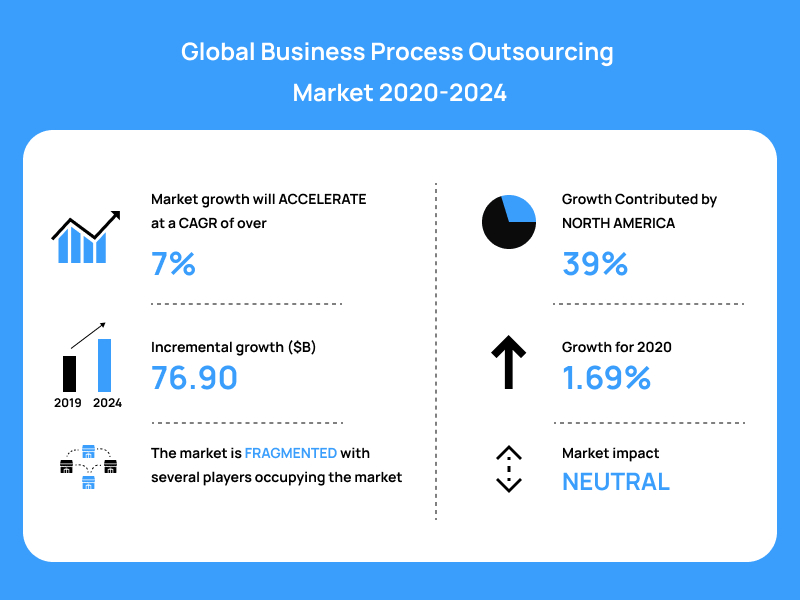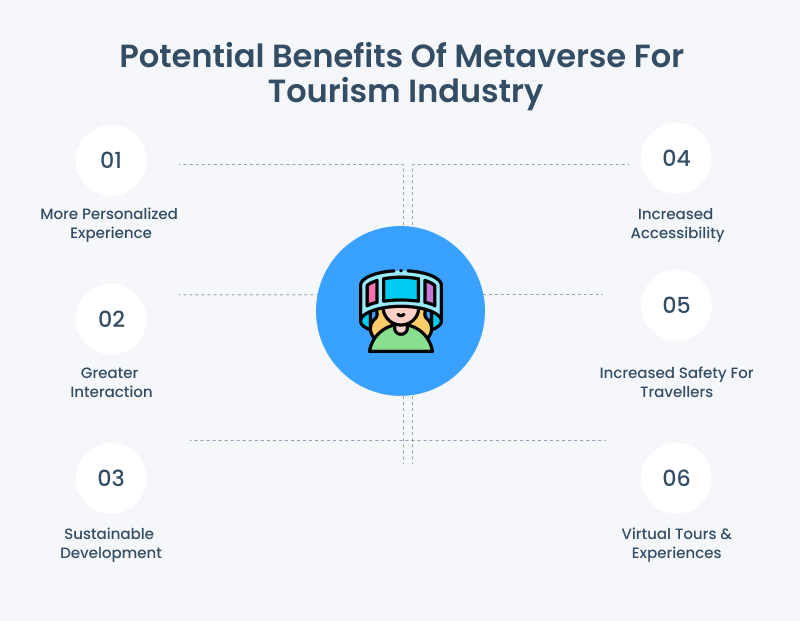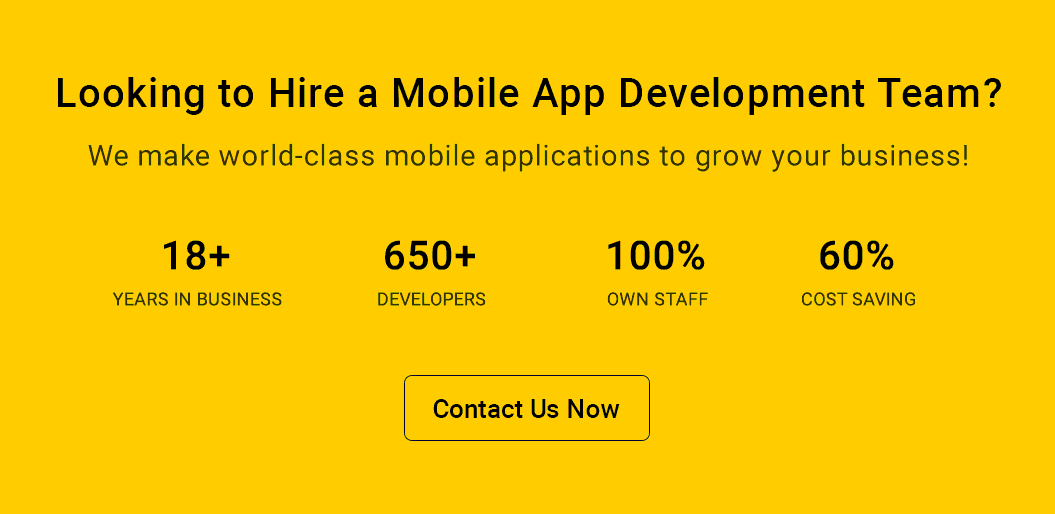Ever dreamt of visiting a world where the limits of reality and imagination don’t exist? Your dream has come true in the form of “Metaverse”.
Metaverse is a virtual world where users can interact, explore and create content through computer-generated environments and avatars.
It has been a popular concept in science fiction for decades, from the first novel to feature Snow Crash, by Neal Stephenson, to movies such as The Matrix and Ready Player One, where characters lived in virtual worlds.
Now, Metaverse is emerging as an exciting new realm for the tourism industry. Tourists can explore new destinations and places without leaving their homes.
The possibilities are endless, from virtual tours to interactive educational experiences and gaming adventures.
Therefore, the following post will explore how Metaverse is shaping the future of the Tourism App Development industry and explore some of its potential benefits and key considerations for adoption.
Also Read: Why Travel & Tourism Industry Needs To Have Mobile Apps?
Metaverse In Tourism – A Global Market Overview
Metaverse in tourism is a rapidly growing market as it offers innovative and immersive experiences to travelers. The metaverse technology provides a virtual environment where users can interact with others, explore destinations, and participate in various experiences.
A market overview of the Metaverse in tourism reveals that the industry is poised for significant growth in the coming years.
According to Technavio’s analyst, the metaverse market in the travel and tourism industry will be worth USD 188.24 billion by 2026, growing at a CAGR of 26.01%.

North America has a significant share of the Metaverse travel market, accounting for 37%.
The growth is driven by increasing demand for immersive and interactive experiences and technological advancements that make these experiences more accessible and affordable.
Custom-built app solutions to unleash the potential of metaverse
Potential Benefits of Metaverse for Tourism Industry
From virtual tours to interactive attractions, metaverses offer an exciting new way to experience the world without ever leaving your home.
So, read on to discover the amazing opportunities metaverses can provide to the tourism industry.
More Personalized Experience
Metaverses offer a much more personalized experience for tourists than traditional travel agencies. By allowing customers to customize their virtual environment, they can tailor their experience to meet their individual needs.
For example, they can choose the type of places they would like to explore and how they want to explore them. It allows them to have a more unique and personal experience than just visiting a physical location.
Metaverses also enable tourists to engage in activities that may not be available in real life. It can create a virtual world and explore in a way they choose.
Increased Accessibility
Metaverses can provide a whole new level of accessibility for tourists. Visitors can explore cities and attractions from anywhere in the world through avatars. It can be particularly beneficial for people with physical disabilities, as they can access attractions that may be difficult or impossible for them to visit in person.
Additionally, metaverses can make information about destinations more readily available to everyone, allowing tourists to make informed decisions about their trip.

Greater Interaction
Metaverses provide a unique opportunity to allow customers to interact with each other and their environment in a completely virtual setting.
It opens up many possibilities for tourists to interact with the sights, sounds, and experiences that come with travel. Metaverses also facilitate tourists to engage with locals in an immersive and realistic way, allowing them to ask questions and discover the culture and history of the area.
Additionally, by providing an online platform where customers can connect and interact with each other, metaverses offer a social aspect to travel. It can lead to greater customer satisfaction and improved customer service.
Increased Safety for Travellers
A Metaverse allows tourists to explore new places without ever leaving their homes. It offers them a level of safety that physical travel can’t. Metaverse is a completely virtual place, so there’s no risk of getting lost, being in a dangerous environment, or worrying about physical safety.
Tourists can access the Metaverse at any time without worrying about their personal information being stolen or compromised.
Moreover, this technology is highly secure, as all transactions are encrypted and stored on secure servers.
Our Success Story: Experience seamless and hassle-free travel planning with our newly developed Travel Platform
Sustainable Development
Sustainability is a significant concern in the tourism industry, as it can hugely impact our environment.
Metaverses for tourism can help address this issue by providing more efficient and sustainable solutions to the industry. In Metaverse, virtual experiences can be designed to mimic nature and its resources while reducing the need for physical transportation, lodging, and other resources.
It can reduce the environmental footprint of tourists and ensure that their experiences are more ecologically friendly.
Virtual Tours and Experiences
By creating an interactive and realistic virtual environment, visitors will be able to explore destinations in a previously impossible way.
Metaverses provide the perfect opportunity for users to go on virtual tours and explore destinations without physically traveling there. These virtual tours offer a glimpse into a destination’s history, culture, and attractions without the hassle or cost of actually traveling.
In addition, these virtual tours can be personalized according to the user’s preferences, enabling them to get the most out of their tour experience.
The tourism industry can also use metaverses to create simulations. These simulations could include educational experiences like exploring underwater sea creatures to create virtual reality games.
Use Cases of Metaverse In Travel
You can now explore destinations worldwide, learn about their culture from the comfort of your own home, and even find great deals on flights, hotels, and more.
Let’s dive in and discover how Metaverse can revolutionize the way we travel!

Virtual Tours
Virtual tours are a great way to experience a destination without leaving your home’s comfort. From discovering new places to exploring ancient ruins, virtual tours allow people to explore like never before.
With the help of virtual reality and augmented reality technologies, travelers can visit destinations worldwide in a fully immersive experience.
A great example of a virtual tour is Google Arts & Culture Street View, which allows you to explore historical sites, monuments, and attractions. There are also virtual tours of popular tourist spots such as the Eiffel Tower and the Taj Mahal.
Custom-built app solutions to unleash the potential of metaverse
Interactive Guides
One of the most exciting uses of metaverse technology in the travel industry is interactive guides. Travelers can now have an immersive and interactive experience that helps them discover and explore new places.
With the help of interactive guides, travelers can learn more about their destination without leaving their homes. Through Virtual Reality (VR) or Augmented Reality (AR), travelers can access information about the destination, such as its history, culture, attractions, and activities.
Interactive guides can also help travelers find restaurants, transportation, and accommodations.
Helpful Resource: Experience The Magic of Augmented Reality With ValueCoders
Virtual Theme Parks
Virtual theme parks are one of the most compelling use cases of the Metaverse in the tourism industry. They allow people to explore and experience a virtual version of their favorite amusement parks without leaving their place.
Virtual theme parks can be incredibly detailed, with rides, attractions, games, music, and much more. Users can also create their avatars and interact with other avatars in the park.
Some examples of virtual theme parks include VR Star Park, a virtual reality theme park created by Disney, and SocialPark, a social media platform for the theme park experience.
Online Booking and Payments
Metaverse technology can revolutionize the way travelers book their trips and make payments. Travelers can easily search for desired activities and attractions, view available options and make payments in an immersive virtual environment.
With Metaverse, travelers can view available accommodation options in a virtual environment, complete the payment process securely, and confirm their bookings without ever leaving the digital space.
Metaverse also has the potential to streamline the process of purchasing tickets for attractions and activities.
Additionally, travelers can use Metaverse technology to securely store all their travel documents in one place for easy accessibility.
Learning About History & Culture
Traveling is not just about having fun. It’s also about gaining knowledge about different places and cultures globally. With the help of metaverse technology, we can now explore and learn more about history and culture in a way that has never been done before.
Virtual reality (VR) can be used to create an immersive experience where users can explore museums, landmarks, and other historical sites.
For example, they can navigate an Ancient Egyptian temple or fly through the Colosseum in Rome.
The technology also allows travelers to learn more about the culture of a specific country or region through a virtual guide.
Destination Window Shopping
If you love to travel, you know that it’s not always possible to do all the research and planning for a trip in advance.
Travelers can use the window shopping feature to browse through photos and videos of potential destinations and view detailed information about the location. It allows travelers to plan their dream trips and save time and money by researching beforehand.
Also, travelers can purchase tickets and make frequent travel reservations for activities and attractions. It will ensure that everything is all set up when they arrive at their destination.
Adopting Metaverse In Tourism: Key Considerations
Many tourism businesses are looking to incorporate Metaverse into their operations. However, there are some key considerations to bear in mind when deciding to adopt Metaverse technology.

Develop a Key Strategy
Identify specific goals and objectives for how the Metaverse will be used in the tourism industry and how it will benefit your business or destination.
However, organizations must consider several key aspects before investing in and adopting Metaverse.
To successfully adopt Metaverse in their business strategy, organizations should clearly understand the customer, technical feasibility, regulatory environment, security implications, and economic viability.
Understand Your Audience
When adopting Metaverse in tourism, it is vital to understand the customer you’re targeting. While this technology can improve the experience of tourists and locals alike, it is also important to understand what kind of environment your customers are used to.
Understand the needs and preferences of your target audience and tailor your metaverse offerings to meet those needs.
It is also important to consider the accessibility of the technology to your target audience. If most of your customers are not comfortable with virtual experiences, then implementing a fully immersive Metaverse might not be the best idea.
Test & Iterate
Testing and iterating is a crucial step in adopting Metaverse technology in the tourism sector. It helps to identify any areas that may need adjustment to ensure the best outcome for users.
Test your metaverse offerings with a small group of users before rolling them out to a larger audience. Collect feedback and make improvements as necessary.
To ensure the success of your Metaverse project, it is important to understand how customers interact with the platform.
Foster Collaboration
When adopting metaverse technologies for tourism, it is essential to consider how to foster collaboration with stakeholders and partners. It includes engaging with businesses, destinations, and industry experts to share knowledge and best practices and to develop new offerings.
Additionally, it is important to consider how you can use the Metaverse to bring together different stakeholders and create opportunities for collaboration.
Suppose you are using the Metaverse to develop a virtual travel experience. In that case, you might want to think about how to get multiple tourist boards, travel companies, and even hotels involved in the Travel App Development process.
Measure & Analyze
When implementing Metaverse in tourism, measuring and analyzing the outcomes is essential. Use metrics and analytics to measure the effectiveness of your metaverse offerings and make data-driven decisions about future developments.
The approach will help you understand the success of your strategy, determine areas for improvement, and refine your approach.
It’s essential to set specific goals and KPIs for your Metaverse implementation in tourism, so you have tangible results to evaluate. Some goals could include increasing customer engagement, reducing acquisition costs, or improving customer experience.
To ensure you’re tracking the right metrics, it’s essential to use data-driven decision-making. Collecting data from customer surveys and analyzing customer behavior can help you identify critical insights.
Keep It Accessible
Make sure that your metaverse offerings are accessible to as many people as possible by considering factors such as device compatibility and internet connectivity.
Also, the tourism industry needs to consider the various ages, ethnicities, and languages of its customer base and any other factors that could affect accessibility.
It is also important to remember that in today’s digital world, accessibility is not limited to physical mobility. For example, people with hearing impairments need to be able to access audio-based content.
Keep Security in Mind
When it comes to using the Metaverse in tourism, security should be a top priority. With the increasing prevalence of cybercrime, tourists must be assured that their data and personal information are secure.
As such, businesses need to implement the highest levels of encryption and authentication protocols to keep their customers’ data safe. Before entering the Metaverse space, it is also essential to consider any local laws and regulations regarding data privacy and security.
Furthermore, businesses should consider the risks associated with allowing users to access the Metaverse from their devices.
Custom-built app solutions to unleash the potential of metaverse
How Can ValueCoders Help
We, at ValueCoders, help businesses offer real-world products and services in the Metaverse world. Our professional IT team highly specializes in AR/VR technology, Software Development processes and has years of experience delivering innovative solutions to clients.
They can work with you to understand your unique business requirements and create Custom AR/VR Solutions that align with your goals and objectives.
Our services can help businesses in various industries, including tourism, education, healthcare, retail, and more.
Whether you need an AR/VR-powered e-commerce platform, training, education solutions, or other innovative applications, ValueCoders has the experience and expertise to help your business succeed in this exciting new market.
With ValueCoders, businesses can leverage the power of AR and VR to drive engagement, improve user experiences, and achieve their business goals.
Helpful Resource: Accelerate your online sales and enhance customer experience with our premium eCommerce development services.
Conclusion
Metaverse technology is rapidly becoming one of the most important digital tools for the tourism industry. It has the potential to revolutionize customer experience, create immersive experiences, and drive significant growth in the industry.
The use of Metaverse in the tourism industry has already begun to show positive results, with major players such as Airbnb and Marriott actively exploring ways to leverage this new technology.
As the industry continues to evolve, more businesses will use the Metaverse to create fantastic customer experiences.
However, it is essential to note that careful planning and considerations must be taken when adopting the Metaverse in tourism.














